Why do we sometimes sleep with mouth open?
So, why do we do it? Why do we wake up with a stain on our pillow and a dry mouth? Well, there are a couple of reasons.
The first reason has to do with your nasal passages. If they're blocked or obstructed in any way – by a cold, allergies, or even just a stuffy nose – it can cause you to mouth breathe at night.
The second reason is related to your sleep position. If you sleep on your back, gravity can cause your tongue to fall back and block your airway. This can make it difficult to breathe through your nose, so you end up mouth breathing.
The third reason… Well, you know what, we'll get into all the other reasons later on, but one thing we have to disclose now is that not only is mouth breathing uncanny to look at, but it's also not good for you.
Mouth breathing can cause all sorts of problems, from snoring and sleep apnea to bad breath and even gum disease. But, let's not get ahead of ourselves for now.
What is the advantage of nasal breathing while sleeping?
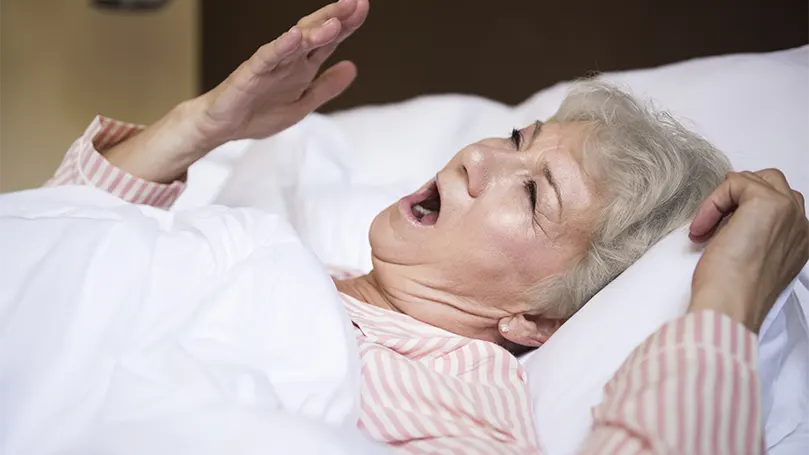
Most mouth breathers… Scratch that. Most of US don't really realise how important nasal breathing is until we can't do it. A standard “don't know what you've got 'til it's gone” situation. See, when we breathe through our noses, the air we inhale is filtered, warmed up and humidified. This is important because it helps to protect our lungs and prevent respiratory infections.
When we mouth-breathe, however, we bypass all of that and the dry air can irritate our throat and cause all sorts of issues. But, how do our noses do all of that?
Well, our noses produce this thing called nitric oxide. And, this gas is sort of magical.
Not only does it help to our lungs absorb oxygen with ease, but it also helps our blood vessels dilate. Nitric oxide, also called nitric monoxide, is also antifungal, antiviral, antibacterial and antiparasitic. So, if you want to think of it as your immune system's first line of defence when it comes to respiratory infections – you can.
So, not only is nasal breathing good for you, but it's also important for your health.
But, that's not all your nose does when you inhale through it. It also warms up and humidifies the air we breathe.
On top of that, as we all know, it acts like a filter and keeps the small, unwanted particles in our noses instead of our lungs. On that note, here's mall piece of advice: When you're clipping your nose hairs – don't go all the way up. Just chop the ones tangling with your moustache and you're good to go.
How do I know that I am breathing through my mouth when sleeping?
You don't have to be a doctor to diagnose mouth breathing. Well, you kind of have to, but trust us – it will be more than obvious that you're not using your nose as intended.
Especially if you share the bed with a partner!
So, here are a few things that could cue you in on whether you're breathing through your mouth or not. Odds are, you'll notice at least one of these things!
Snoring
Snoring and mouth breathing go hand in hand. There are no two ways about it. Whether you're so loud you're waking yourself up or just annoying enough to keep your partner up at night, snoring is a tell-tale sign that you're mouth breathing.
And, while there is such thing as nose-based snoring, that doesn't mean you're snoring through your nose. That just means there's a nose-based problem like a deviated septum or a cold that's making you breathe through your mouth.
Dry mouth
If you ever wake up with your mouth so dry you can hear it when you try and open them, that's another sign you were mouth breathing in your sleep.
A dry mouth is often accompanied by a white tongue and a burning sensation as a result of the dryness.
Bad breath
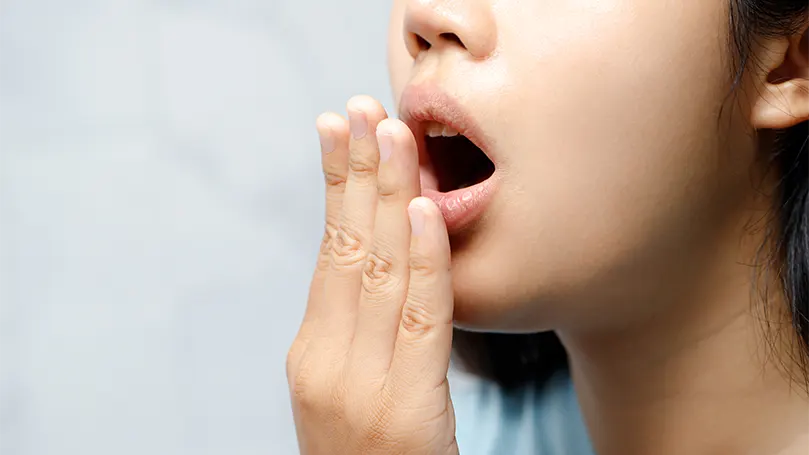
Another thing accompanying your dryed out mouth is the dreaded morning breath. We all experience it from time to time, but if you find yourself gagging from your own breath as soon as your alarm goes off – it's time to take action.
And, by action, we don't mean brushing your teeth – that's a given. We mean trying to solve this issue.
Chronic fatigue
Apart from disrupted oral health, chronic mouth breathing can also lead to that dreaded feeling of fatigue and grogginess.
While it's normal to feel a little sleepy after a night of mouth breathing, if you find that you're struggling to concentrate and focus during the day, it might be time to pay the ol' doc a visit.
Dark circles around your eyes

While we usually attribute the dark circles around our eyes to a lack of sleep (which is not wrong), it can also be a sign of mouth breathing.
If regularly manage to get 7 to 9 hours of sleep but still look like you haven't slept in days, it might be time to check if you're breathing the way you're supposed to.
What is the cause of mouth breathing?
As we've said in the beginning, there are so many reasons why you're not breathing through your nose during the night.
And, more often than not, it's more than likely that you're suffering from more than one.
Nasal congestion
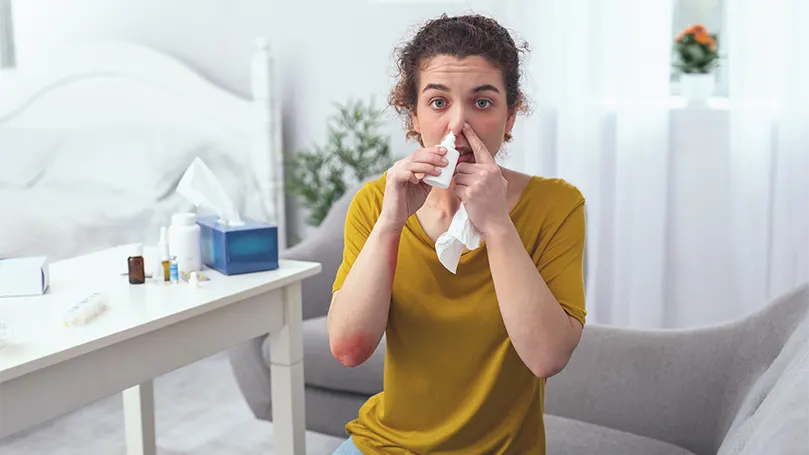
The most common and most obvious one is nasal congestion. When you have a cold or the flu, it's more than likely that your nose is blocked and you're struggling to breathe through it.
In that case, the best thing you can do is to use a nasal spray or a saline solution to cleanse your nostrils and unblock them.
Just make sure you don't go overboard with it. A single pchit-pchit should last you for the night.
Enlarged adenoids
The adenoids are a small mass of tissue located at the back of the nose, above the roof of the mouth. They're there to help fight infection but can sometimes get swollen and block the airway, causing problems with nasal breathing.
Enlarged or swollen adenoids are most common in mouth-breathing children, as they often grow during childhood and then disappear during early teens, but they can also affect adults.
In fact, a study has shown that nasal obstruction in adults is caused by enlarged adenoids one out of five times.
Deviated septum
A deviated septum is the bane of many mouth breathers' existences. It's a condition where the cartilage that separates the two nostrils is crooked or off-centre, which can lead to difficulty breathing through the nose.
It's a common condition, affecting around 80% (according to some estimates) of the population to some degree, and is often the result of an injury, such as a broken nose.
While a deviated septum can be treated with surgery, it's not always necessary. In some cases, using nasal sprays or antihistamines can help to unblock the nose and improve airflow, although as we all know, nasal sprays aren't a good long-term solution.
Nasal polyps
Nasal polyps are small, non-cancerous growths that develop on the lining of the nose or sinuses. Like any other polyps, these things are caused by an array of things and it's often impossible to know how or why they've appeared.
The thing about nasal polyps is they can cause a lot more than just mouth-breathing. In fact, they can even lead to a lost sense of smell, post-nasal drip, nosebleeds, snoring and so on.
Thankfully, a pretty standard surgery will solve the issue.
Cold & flu
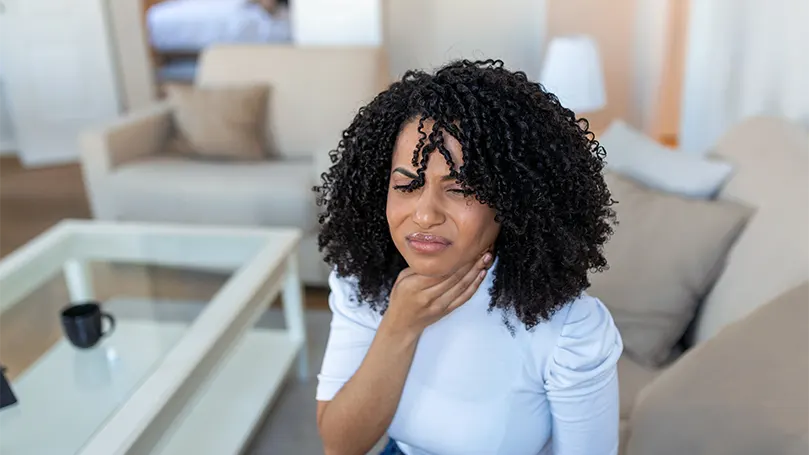
This one's rather easy to understand and by far the most common cause for mouth breathing. When you have a cold or the flu, your nose is blocked and it's difficult to breathe through it.
In that case, all you can do is wait it out, have some OTC meds and use a nasal spray to let the air in.
Tongue tie
Not to be mistaken with a tongue tie you get when there's a hot person talking to you, a tongue tie (or ankyloglossia) is a condition that's present at birth and limits the movement of the tongue.
While it might not sound like a big deal, it can actually cause a lot of problems, such as difficulty breastfeeding, eating and speaking. It can also cause mouth-breathing, as the condition can prevent the development of the upper palate.
Thankfully, nowadays, surgery to fix this issue is usually done within the first three months after birth, so there won't be many adults in the following years suffering from this issue.
Sleep apnea
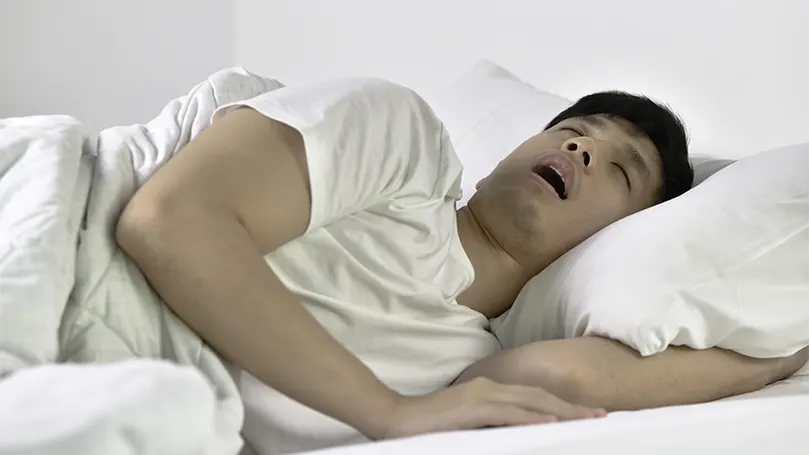
Unfortunately often ignored, sleep apnea is a condition that's more serious than you might think. It's a sleep disorder that causes disruptions in your breathing patterns, which can lead to mouth breathing and snoring – but those are pretty much the least of your worries.
But, since we're on the subject of being unable to breathe through your nose at night, let's leave it at that.
Tumours
Once again, in case of this particular problem, mouth breathing would be the least of your concerns. But nevertheless, a tumour (whether cancerous or not) can cause a blockage in the nose, which would result in difficulty breathing.
As simple as that.
Stress & anxiety
Stress and anxiety, especially panic attacks, will cause you to breathe irregularly. This, in turn, will almost always lead to mouth breathing, as your body feels like it's not getting enough oxygen.
The good news is that this is often a temporary issue and it will go away as soon as the stressor is gone.
In the meantime, try to focus on your breathing and focus on taking slow, deep breaths – through your nose. That should help you calm down and handle the attack easier.
Are there any risks of breathing through the mouth while sleeping?
A better question would be – how many risks are there? Nighttime mouth breathing is associated with so many risks is kind of hard to name them all and not forget anything. But, we'll do our best.
Dehydration
First things first, mouth breathing can cause dehydration, which is why so desperately crave water once you wake up.
When you breathe through your mouth, the air you inhale drys up your mouth and also messes up your saliva production.
All of this can cause all sorts of problems, such as gum disease, tooth decay, cavities and an increased risk of infection.
Facial deformations
Term mouth-breather is usually pejorative, and when you factor in the fact that mouth breathing can cause facial (mainly jaw and chin) deformities, you can kind of understand why.
Mouth breathing can cause the lower jaw to recede and the upper teeth to crowd, which can give you an appearance of an overbite, as well as an actual overbite.
This is why treating mouth-breathing in children is imperative. As soon as you notice!
Hoarse voice
It's not uncommon for mouth breathers to wake up with a hoarse voice in the morning. And while it might not sound like a big deal, it can actually be quite bothersome and even leave long-lasting consequences.
While some of you may prefer a raspy, hoarse voice, that usually doesn't translate all too well to oral health as well as your vocal cord health.
Allergies
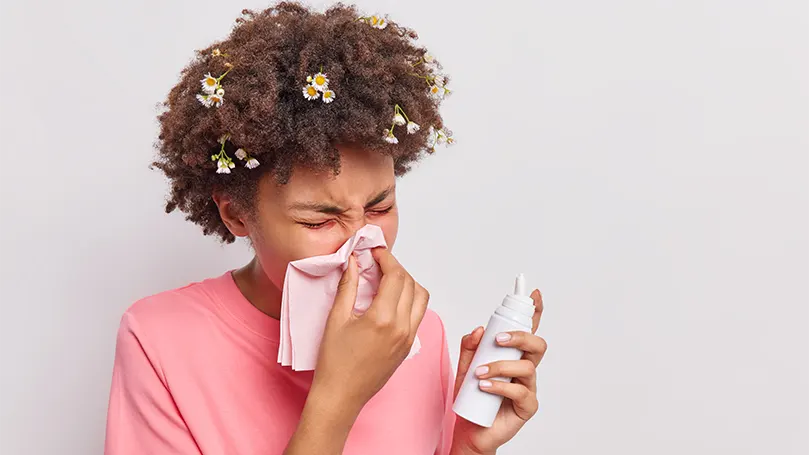
As we've said in the beginning, breathing through your nose filters out the particles from the air.
That doesn't happen when you inhale through your mouth, which can cause all sorts of problems for people who suffer from allergies.
In other words, if you suffer from seasonal or any other kind of allergies, mouth breathing can actually make them worse by allowing pollen or dust into your airways.
Headache
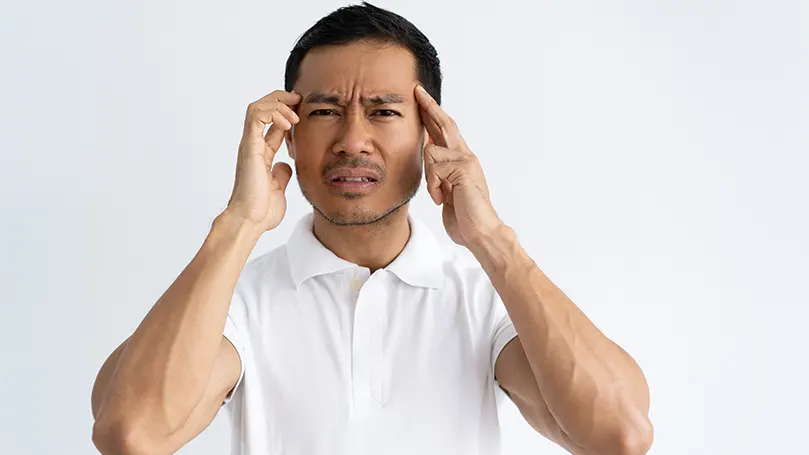
Headaches and migraines are relatively common problems among folks breathing through their mouths. And while we don't know the exact reason why that is, it's probably because of the dehydration we've mentioned earlier.
Not to mention the fact that when you breathe through your mouth, you're not getting nearly enough oxygen, which can also lead to headaches and migraines.
Asthma
While mouth breathing won't cause asthma, it could certainly aggravate your symptoms, as well as make the condition worse.
Mouth breathing can cause the airways to become dry and irritated, which can lead to an asthma attack.
So, if you suffer from asthma, it's probably best to try and practice breathing through your nose as much as possible.
How to prevent sleeping with your mouth open and breathing through your mouth while sleeping?
Now, let's try and learn how to stop mouth breathing.
Regular nose cleaning

Keeping your nozzle nice and clean is a great way to prevent mouth breathing. And while you can certainly do that yourself, we would suggest you take our piece of advice from earlier and not try and clip your nose hairs too much.
Apart from that, regular nose hygiene should help. Remove any mucus or crust that might have built up during the day (or night) and try to keep your nose as clean as possible.
Nasal decongestants
Nasal sprays and strips or saline solutions can also help you breathe through your nose more easily.
Decongestants can be quite helpful if you have a cold or suffer from allergies, as they offer almost instant relief.
Just make sure you don't use them for more than a few days in a row, as they can actually make your congestion worse if used for too long.
Also, we'd advise against neti pots. While they can help clear your sinuses, they can also increase your risk of infection unless they're absolutely squeaky clean.
Antihistamines
Antihistamines can be given to you if your nose is blocked or you're dealing with allergies that have caused your nasal tissues to swell up.
And while they can certainly be helpful, they come with a whole host of side effects.
One of these side effects is dehydration. So, if you're already prone to mouth breathing, antihistamines could actually make the problem worse if your congestion is super tough to handle. So, turn to them only if your doctor has advised you to.
Over-the-counter medications

If your immune system is being bombarded with flu and cold-causing viruses, or you're constantly dealing with allergies, it might be a good idea to talk to your doctor about some over-the-counter medication options.
These can be a pretty effective short-term solution, but they shouldn't be used for more than a few days in a row – just like nasal sprays.
Elevated head
A proper pillow can do more than you can imagine. If you often find yourself mouth breathing at night, it might be because your head isn't properly elevated.
In other words, when you sleep, your head should be at a higher level than the rest of your body. This will ensure that your airways are open and that you're not struggling to breathe through your nose.
Conscious nose breathing
It's important you make a conscious effort to breathe through your nose during the day. This way, you'll train your body to do it automatically at night.
Of course, this won't be easy at first and it certainly won't happen overnight, but it will pay off in the long run.
Even when you're working out and you feel like you need to take some deep breaths through your mouth – use your nose and control your breathing. You'll feel the effects soon enough.
Surgery
Finally, if all else fails, you can always opt for surgery. This is usually the last resort when it comes to treating mouth breathing, but it is usually more than effective.
Whether it's polyps or deviated septum you're dealing with, these procedures can do wonders for people who can't seem to get their mouth breathing under control.
Conclusion
Mouth breathing can be a difficult habit to break, but it's not impossible.
If you're struggling to breathe through your nose at night, reflect on some of the causes we've mentioned and try and figure out which one is causing your trouble. Also, try some of the tips and tricks we've suggested.
From nasal sprays and strips to over-the-counter medications, there are plenty of solutions that can help you get your breathing under control. And if everything else proves ineffective – surgery is always an option.
So don't give up! Keep trying until you finally wake up with your pillow clean and your mouth closed! And if you're somehow still wondering “why do I sleep with my mouth open”, ask us any additional questions in the comments!

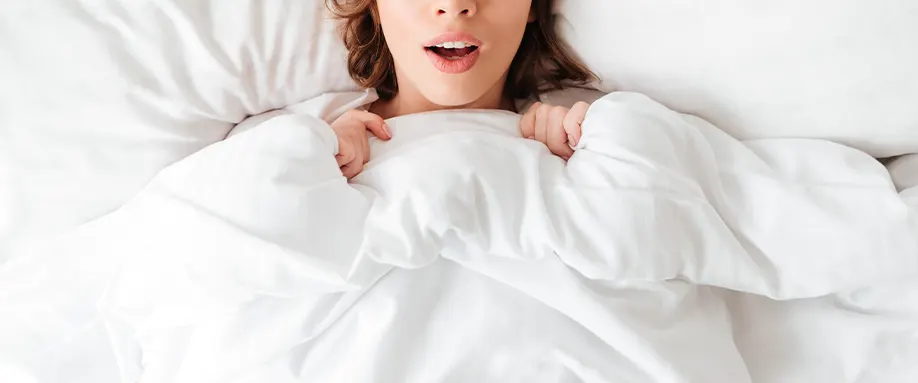











There are no comments yet
"*" indicates required fields